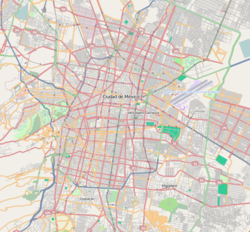Top Qs
Timeline
Chat
Perspective
Guelatao metro station
Mexico City Metro station From Wikipedia, the free encyclopedia
Remove ads
Guelatao metro station[b] is a Mexico City Metro station in the city's borough of Iztapalapa. It is an at-grade stop that serves Line A (Purple Line) between Tepalcates and Peñón Viejo, servicing the colonias (neighborhoods) of Ejército de Oriente and Voceadores. The station provides access to the Facultad de Estudios Superiores (FES) Zaragoza of the National Autonomous University of Mexico (UNAM).
Guelatao metro station is named after the town of San Pablo Guelatao, Oaxaca, where Benito Juárez, the 26th president of Mexico, was born. Its pictogram depicts the sculpture on top of the Museo Cabeza de Juárez, found near the station. The stop opened on 12 August 1991 providing service northwest toward Pantitlán and southeast toward La Paz. In 2024, the station had an average daily entrance of 16,688 passengers.
Remove ads
Location and layout
Summarize
Perspective
Guelatao is an at-grade metro station along Calzada Ignacio Zaragoza, in eastern Mexico City.[2][3] It serves the Colonias (neighborhoods) of Ejército de Oriente and Voceadores in Iztapalapa.[2] The station's pictogram features the silhouette of the sculpture atop the nearby Cabeza de Juárez museum. The artwork depicts the head of Benito Juárez, who served as president of Mexico from 1858 to 1872.[2] Juárez was born in the town of San Pablo Guelatao, in Guelatao Municipality, Oaxaca; the word guelatao means "enchanted lagoon" in Zapotec.[4]
Guelatao metro station has two exits along Calzada Ignacio Zaragoza. The northern exit is at the corner of Calle General Miguel Lira y Ortega in Colonia Voceadores and the southern one is at Calle Batallón de la Zacapoaxtla in Colonia Ejército de Oriente.[2] The station provides access to the Facultad de Estudios Superiores (FES) Zaragoza of the National Autonomous University of Mexico (UNAM).[5]
The station is located between Tepalcates and Peñón Viejo stations on the line.[2] The area is serviced by Route 9-D of the city's public bus system[6] and by Routes 162-B, 163, 163-A, 163-B, 164, 166, and 167 of the Red de Transporte de Pasajeros network.[7]
Remove ads
History and construction
Line A of the Mexico City Metro was built by Empresas ICA.[8] The line was opened on 12 August 1991, operating from Pantitlán to La Paz, located in the municipality of the same name of the State of Mexico.[9] The stretch between Guelatao and Tepalcates spans 1,161 meters (3,809 ft), while the segment toward Peñón Viejo measures 2,206 meters (7,238 ft), the longest interstation section of the system.[10]
Remove ads
Ridership
According to the data provided by the authorities, before the impact of the COVID-19 pandemic on public transport, commuters averaged per year between 10,500 and 22,700 daily entrances between 2015 and 2019.
The station had a ridership of 6,108,164 passengers in 2024, marking a decrease of 694,803 passengers compared to 2023. In 2024 specifically, Guelatao metro station ranked as the 70th busiest station out of the system's 195 stations.[1]
Gallery
- The sculpture on top of the Museo Cabeza de Juárez served as the inspiration for the station's pictogram.
Notes
- The data here is limited to the most recent ten years to avoid excessive listings; earlier figures can be found in this page's history or on the Mexico City Metro website. To calculate the average daily ridership, the annual total is divided by 365 days (366 in leap years), with decimals omitted from the result. Each station is ranked individually, as the system counts transfer stations separately. The percentage change is calculated automatically using the data from the current year and the previous year.
- Estación del Metro Guelatao. Spanish pronunciation: [ge.la'tao] ⓘ. The etymology comes from the Zapotec language, "Enchanted lagoon".
Remove ads
References
External links
Wikiwand - on
Seamless Wikipedia browsing. On steroids.
Remove ads






